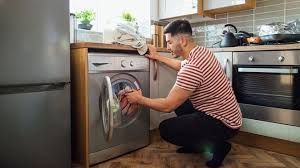Risky Rinses: 5 Uncommon Threats in Dishwasher Failures
In today's bustling households, a functional dishwasher stands as an indispensable ally, streamlining the chore of cleaning and sanitizing dishes. Its convenience is often taken for granted until an unexpected malfunction occurs. Yet, beyond the common issues like drainage problems or leaks that are widely discussed, lie a set of less-known threats lurking within dishwasher failures. These threats, often underestimated or overlooked, pose risks that extend far beyond mere inconvenience.
Understanding the vital role of a fully operational dishwasher transcends mere convenience; it encompasses the very essence of a smoothly functioning household. However, within the intricate mechanisms of this everyday appliance lie lesser-known risks that, if left unattended, can result in more than just a temporary inconvenience. Delving into these uncommon threats is crucial in recognizing the depth of potential issues that dishwasher malfunctions can trigger.
In this exploration, we uncover five uncommon threats stemming from dishwasher failures, shedding light on electrical hazards, water-related damages beyond mere leaks, the insidious buildup of chemical residues, the unsettling specter of bacterial growth, and even the potential risk of fire. Unraveling these threats goes beyond the mundane inconveniences and prompts a deeper understanding of the significance of maintaining a fully functional dishwasher for a safe and hygienic household environment.
Common Dishwasher Problems
Common dishwasher problems encompass a spectrum of issues that households frequently encounter, disrupting the seamless functioning of this indispensable kitchen appliance. Among these, drainage complications, leaks, and cycle malfunctions stand as the most prevalent and disruptive challenges.
Drainage Issues
One of the most commonly encountered problems in dishwashers revolves around drainage. A clogged or obstructed drainage system can impede the proper expulsion of wastewater, leading to standing water at the bottom of the appliance after a cycle. This can result from food particles, debris, or grease obstructing the drain, causing foul odors and unsanitary conditions within the dishwasher.
Leaks
Leakages pose another significant concern. Whether it's a malfunctioning door seal, a damaged hose, or a cracked internal component, leaks can manifest in various forms, from minor drips to substantial spills. Such leaks not only compromise the effectiveness of the dishwasher but can also cause water damage to surrounding cabinetry and flooring if left unaddressed.
Cycle Malfunctions
Cycle malfunctions encompass a broad category of issues, ranging from the dishwasher failing to start or complete a cycle to irregularities within the wash or rinse cycles. Incomplete cleaning, erratic noises during operation, or the appliance shutting down mid-cycle are frequent indications of cycle malfunctions. These problems often disrupt the efficiency of the dishwasher, leaving dishes inadequately cleaned and increasing water and energy consumption.
Addressing these common problems promptly is crucial to ensure the smooth operation of the dishwasher. Regular maintenance, such as clearing debris from the drainage system, inspecting seals for wear and tear, and monitoring the cycles for irregularities, can help prevent these issues from escalating into major malfunctions. Identifying and resolving these common problems not only sustains the dishwasher's performance but also preserves the cleanliness and functionality of the kitchen environment.
Uncovering Uncommon Threats
Let's explore the details of these uncommon threats stemming from dishwasher failures:
1. Electrical Hazards:
Electrical malfunctions within a dishwasher pose a significant threat. Faulty wiring, damaged circuits, or compromised electrical components can lead to short circuits or electrical fires. These hazards are particularly concerning as dishwashers inherently deal with water, creating a potential electrocution risk if the electrical system malfunctions while in use. Moreover, an unnoticed electrical issue can escalate, posing danger not only to the appliance but to the entire household.
2. Water Damage Beyond Leaks:
While leaks are commonly recognized as a form of water damage, internal issues within the dishwasher can cause more subtle yet equally damaging consequences. Faulty seals, damaged hoses, or issues with the water inlet valve can lead to water seepage into critical components of the dishwasher, causing corrosion, rusting, or even structural damage over time. Such damages, if left unaddressed, can compromise the appliance's functionality and potentially escalate to more extensive water-related problems in the kitchen environment.
3. Chemical Residue Concerns:
The regular use of detergents and cleaning agents in dishwashers can lead to the buildup of chemical residues within the appliance. Over time, these residues can accumulate on internal components, such as filters, spray arms, or the tub, hindering the dishwasher's performance. Furthermore, excessive buildup may lead to blockages, affecting water circulation and compromising cleaning efficiency. Not only does this impact the appliance's functionality, but it may also leave residues on dishes, posing potential health risks if consumed.
4. Bacterial Growth and Hygiene:
Dishwashers provide a warm and moist environment—ideal conditions for bacterial growth if not properly maintained. Malfunctions that impede proper drainage or heating cycles can result in stagnant water or inadequate sanitization, fostering the growth of harmful bacteria. This can contaminate dishes and kitchenware, posing health risks to individuals using these items for eating or cooking.
5. Fire Risks:
The combination of electricity, heat, and water within a malfunctioning dishwasher can elevate the risk of fires. Overheating due to electrical faults or the accumulation of flammable residues can lead to fires originating within the appliance. Additionally, if the dishwasher is in close proximity to flammable materials or cabinetry, a fire within the appliance can escalate and pose a serious threat to the entire kitchen area.
Recognizing these unusual risks highlights the significance of consistent upkeep, timely repairs, and attentive supervision of dishwasher functionality to minimize these dangers and uphold a secure and sanitary kitchen setting. Trusted professionals such as
Authorized Appliance offer specialized repair services, ensuring expert solutions to tackle these issues, safeguarding a clean and safe kitchen environment.
Impact and Consequences
The implications of the uncommon threats stemming from dishwasher failures extend far beyond the confines of the appliance, impacting households in various profound ways:
Safety Risks:
The foremost concern revolves around safety hazards. Electrical malfunctions, water damage, and the potential for fires pose immediate risks to the household's safety. These threats not only endanger the integrity of the kitchen but also pose a direct risk to the well-being of individuals within the household.
Health Concerns:
Bacterial growth resulting from dishwasher malfunctions can compromise the hygiene of dishes and utensils. This can lead to potential health hazards, increasing the risk of foodborne illnesses or infections. Chemical residues left on dishes due to inadequate cleaning can also pose health risks if ingested.
Property Damage:
The consequences of water-related damages extend beyond the dishwasher itself. Leaks or internal water damage can cause structural harm to surrounding cabinetry, flooring, or countertops. If left unchecked, these issues can lead to costly repairs and renovations within the kitchen space.
Disruption of Daily Life:
A malfunctioning dishwasher disrupts the daily routines of households. Inefficiency in cleaning dishes can lead to the accumulation of dirty dishes, causing inconvenience and added workload. Moreover, the need for frequent handwashing of dishes consumes time and water, disrupting the usual flow of kitchen activities.
Financial Implications:
Addressing the aftermath of dishwasher-related threats can lead to unexpected financial burdens. Repair costs, potential property damages, increased utility bills due to inefficient appliances, and healthcare expenses resulting from health issues can strain household budgets unexpectedly.
Due to the broader implications of these threats, proactive maintenance, regular inspections, and prompt dishwasher repairs are essential. A well-maintained and properly functioning dishwasher not only ensures a safer and healthier environment but also contributes to the overall efficiency and harmony within the household. Taking preventative measures to mitigate these threats not only safeguards the kitchen's functionality but also preserves the well-being and financial stability of the household.
Prevention and Maintenance
Here are some tips to prevent uncommon threats stemming from dishwasher failures through regular maintenance:
Electrical Safety Checks:
- Keep an eye out for any signs of damage or wear on the power cord and plug.
- Ensure the dishwasher is properly grounded to prevent electrical issues.
- Consider professional electrical inspections periodically to detect any potential hazards.
Monitoring Water Connections:
- Routinely examine hoses, seals, and connections for leaks or signs of deterioration.
- Make sure the water inlet valve is not blocked or malfunctioning.
- Replace damaged or worn-out parts promptly to prevent water-related damages.
Cleaning and Maintenance of Internal Components:
- Regularly clean filters, spray arms, and the dishwasher tub to prevent chemical residue buildup.
- Use dishwasher-safe cleaning agents to remove mineral deposits or grease from components.
- Run cleaning cycles with vinegar or specialized dishwasher cleaners to eliminate residues and odors.
Ensuring Proper Drainage:
- Clear debris from the drain regularly to maintain proper water drainage.
- Check and clean the dishwasher's drainage system, including the filter and drain hose, to prevent blockages.
Hygiene and Bacterial Control:
- Periodically run the dishwasher on a hot water cycle to sanitize the interior and eliminate bacteria.
- In order to prevent moisture buildup, keep the dishwasher door slightly ajar after each use.
Regular Inspections and Maintenance Routine:
- Establish a maintenance schedule to inspect the dishwasher for signs of wear, leaks, or irregularities.
- Address minor issues promptly before they escalate into larger problems that pose greater risks.
Professional Servicing and Repairs:
- Consider professional servicing annually to assess the dishwasher's functionality and address potential issues.
- Engage certified technicians for repairs and seek professional help if encountering persistent problems.
By implementing these preventive measures and incorporating regular maintenance into household routines, homeowners can significantly reduce the likelihood of uncommon threats arising from dishwasher failures. A proactive approach to maintenance not only safeguards against potential risks but also prolongs the lifespan and efficiency of the appliance, ensuring a safer and more functional kitchen environment.
Conclusion
Understanding and tackling the lesser-known threats within dishwashers is pivotal for maintaining a secure and efficient kitchen environment. Through proactive maintenance and regular checks, households can safeguard against risks like electrical hazards, water damage, and bacterial growth. This not only ensures the appliance's longevity but also protects the well-being and hygiene of the household, fostering a safe and thriving kitchen space for daily routines.




